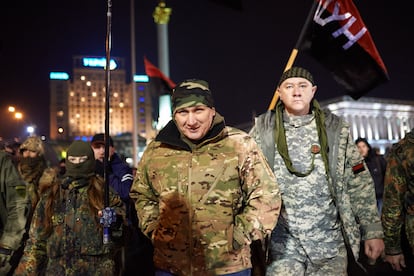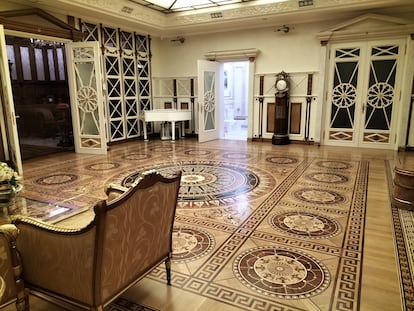The luck of the Ukrainian oligarchs is beginning to change
All powerful until now, the richest men in the country are experiencing substantial losses due to the Russian invasion, while Zelenskiy’s government and Brussels are putting them in a tight spot


In the room of former Ukrainian president Viktor Yanukovych, in his residence on the outskirts of Kyiv, there is no trace of the Picassos or the Aivazovskys that used to hang on its walls. What does remain are the gigantic empty dressing rooms where the president’s girlfriend once had a space with capacity for a thousand rings. There were also many, many television sets. In the ample residence where the couple lived more than comfortably, there were up to 18 Samsung sets, sometimes several in the same room. Books, on the other hand, were practically non-existent.
However, the most valuable objects - works of art, furniture, jewelry - are no longer here. The former president took them in his hasty flight to Russia during the 2014 Maidan uprising that would change the country’s history. Anyone who is curious can see on YouTube how Yanukovych’s assistants loaded trucks for three days in order to get the spoils from so many years of looting out of the country. After his departure, shocked citizens entered the mansion to discover the shameless ostentation in which their leader had lived.
The mansion where Yanukovych spent his days of relaxation is much more than a house. Not only because the 150 hectares of the Mezhyhirya estate housed a zoo (with the friendly ostriches that are still there today, undaunted by the distress that Ukraine is experiencing), a museum with the luxury cars that the former president collected, a heliport, a tennis court, two huge golf courses, a spa with several saunas and 40 pieces of sports equipment, a shooting range, endless fountains and lakes, and even an artificial mountain complete with a waterfall. All this, just for the man who ruled Ukraine and his girlfriend. If his children visited, they slept in another house. Russian President Vladimir Putin also had another residence in the complex, in case he ever went to Kyiv. And at banquets with many diners, a dining boat received the guests. “During construction, it was estimated that each day of work cost $2 million. It would be impossible to calculate the value of all this,” certifies the guide Genadii Nikolaenko.

Since his flight to Russia, Yanukovych has been an outcast in Ukraine. But Rinat Akhmetov, the oligarch who sponsored his political career, catapulting him to the top, is still the first fortune of his country, with a wealth that Forbes estimated last year at about $7.6 billion. Akhmetov is the most prominent name in the list of Ukrainian oligarchs who control the country through a network of companies and connections. However, luck seems to be changing for this select group.
A dangerous mix
Several factors threaten the position of the men who, until now, have defined the map of power, and who also managed to create political parties that obeyed their personal interests. On the one hand, the war launched by Russia is striking some vital nerves in their finances. On the other, the simultaneous political pressure from Kyiv and Brussels threatens to hurt them even more; a dangerous mix for those who filled their pockets with the privatizations of the 1990s after the collapse of the Soviet Union.
“To understand the role of the oligarchs, it is enough to think of medieval Europe, with kings who competed for power with feudal lords,” explains Volodimir Yermolenko, director of the Ukraine World website, from a placid terrace in Kyiv. This journalist admits that the excessive power of this small number of people is a burden for the country, but he also believes that, to a certain extent, the competition between the powerful entails a kind of balance game that prevents the authoritarian drift of the country that a single leader would imply, as is the case in Russia, where all the oligarchs are subject to the will of the Kremlin.
Akhmetov is the owner, among many other things, of Azovstal, the steel mill that gained worldwide notoriety for becoming the last point of resistance against the Russians in Mariupol, in southern Ukraine. This gigantic complex, one of the sources of Akhmetov’s fortune, generated tens of thousands of jobs, produced 40% of the country’s steel and had its own port at the Sea of Azov.

In May, the tycoon who used to boast privileged ties to Moscow - and who sponsored Yanukovych - announced a $17-20 billion dollar lawsuit against Russia for the destruction of the plant and other assets in the Donbas area. Some analysts estimate that Akhmetov has lost two-thirds of his fortune since the beginning of the war. But for many businessmen the problems are not new; they began in 2014, with the seizure of Crimea and the beginning of the war in Donbas. “The key to seeing if they will recover their former power will be in how the reconstruction tasks are executed and who is entrusted with them,” says a European source. Another oligarch who’s fallen from grace is Viktor Medvedchuk, the Ukrainian billionaire closest to Putin; he was arrested in April accused of “high treason” by the Kyiv authorities.
Zelenskiy’s crusade
The oligarchs are not only haunted by financial problems. Perhaps more dangerous for their interests is the political crusade against them. In November 2021, before the Russian troops entered with force and fire, President Volodimir Zelenskiy had already promoted a law to reduce the weight of the tycoons, a group that included some 40 people with an industry monopoly, media outlets, a fortune of more than $90 million, and who take part in political activities. Some critical voices pointed out that, with this initiative, Zelenskiy was not seeking to balance the map of power, but rather to undermine the influence of former President Petro Poroshenko. Zelenskiy himself also has a group of oligarchs around him.
In addition to leading the opposition, Poroshenko is one of the richest men in the country thanks to an empire of candy, cars, media outlets and much more. The tycoon faces up to 15 years in prison for high treason, for the purchase of coal from the pro-Russian separatists of Donetsk, as well as other charges of corruption, trials that he sees as politically motivated.
In an interview with EL PAÍS, last week Poroshenko made the case for demanding responsibility from those “who ruin the country by stealing billions of euros.” Reminded that he too is an oligarch, he angrily protested. “Please don’t use that word!” he exclaimed. “We are in a war right now. And who has stayed here to defend their country, and who has fled? Who is spending their money to support the army and who is stealing? Who pays their taxes and who doesn’t?” His spokesmen assure that he has invested more than €10 million out of his own pocket to help defend Ukraine.
The pressure also comes from Brussels, who wants to get its hands on the Ukrainian super-millionaires. When approving the country’s candidacy to join the EU, the European Commission demanded seven chapters of reforms, one of them to advance the anti-oligarch law. But this must be done, according to Brussels, avoiding arbitrariness. The document also recalled the “disproportionate” influence of these businessmen on the media, especially on television.
Before the war, the gardens that witnessed Yanukovych’s excesses were full of families having picnics. This place, which the guide considers “the heart of Ukraine” due to a story that goes back to the 12th century when a monastery was founded there, is now a public museum and it also served as a refuge when Russian troops approached Kyiv. But it also symbolizes the rise and fall of the man who wanted to control the entire country. Yanukovych, in the words of the journalist Yermolenko, tried to be king and feudal lord at the same time. The question is whether the oligarchs who accompanied him in his career will know how to adapt to a new era of an increasingly European Ukraine, or if they will fall by the wayside.
Tu suscripción se está usando en otro dispositivo
¿Quieres añadir otro usuario a tu suscripción?
Si continúas leyendo en este dispositivo, no se podrá leer en el otro.
FlechaTu suscripción se está usando en otro dispositivo y solo puedes acceder a EL PAÍS desde un dispositivo a la vez.
Si quieres compartir tu cuenta, cambia tu suscripción a la modalidad Premium, así podrás añadir otro usuario. Cada uno accederá con su propia cuenta de email, lo que os permitirá personalizar vuestra experiencia en EL PAÍS.
¿Tienes una suscripción de empresa? Accede aquí para contratar más cuentas.
En el caso de no saber quién está usando tu cuenta, te recomendamos cambiar tu contraseña aquí.
Si decides continuar compartiendo tu cuenta, este mensaje se mostrará en tu dispositivo y en el de la otra persona que está usando tu cuenta de forma indefinida, afectando a tu experiencia de lectura. Puedes consultar aquí los términos y condiciones de la suscripción digital.








































